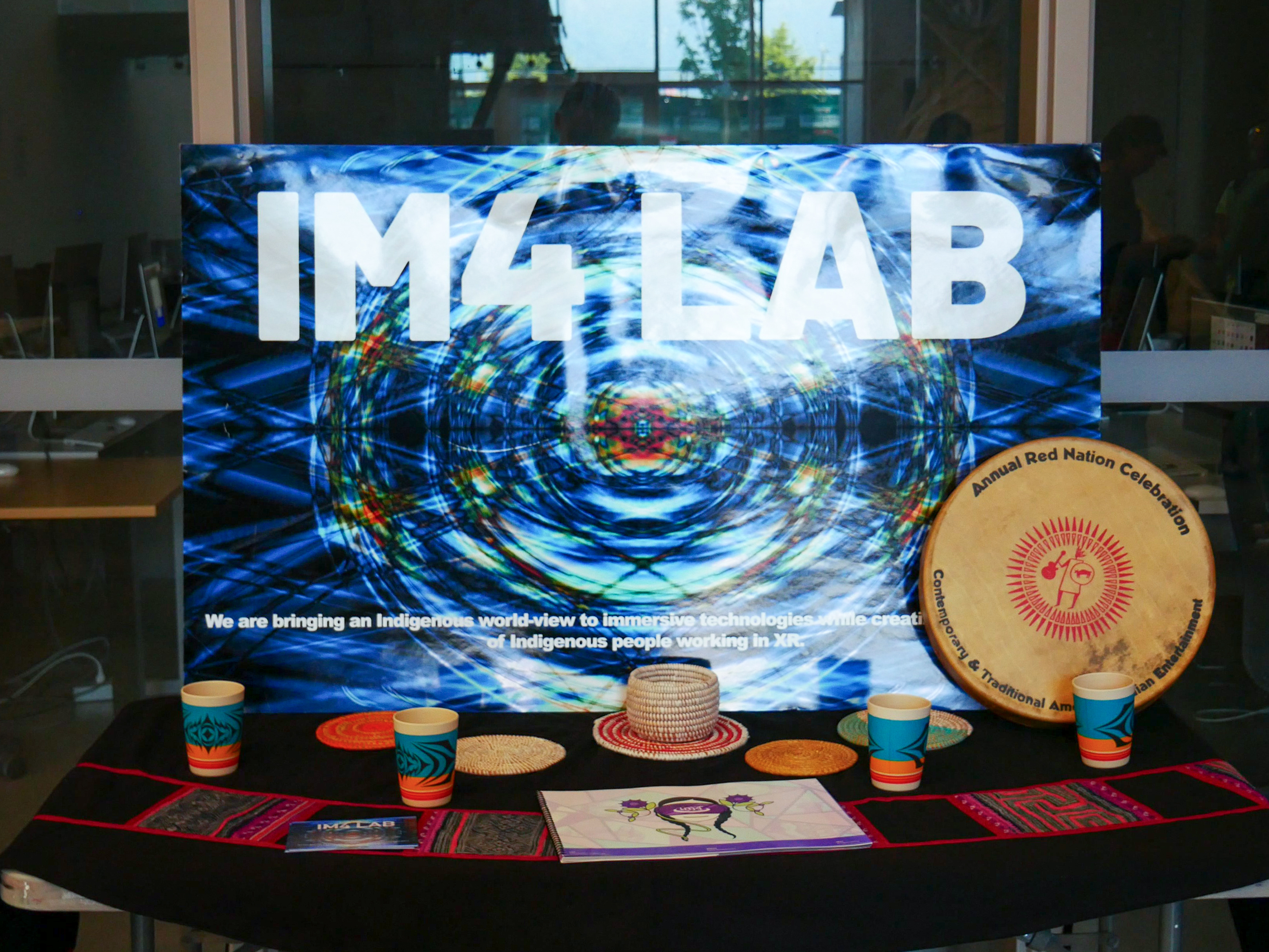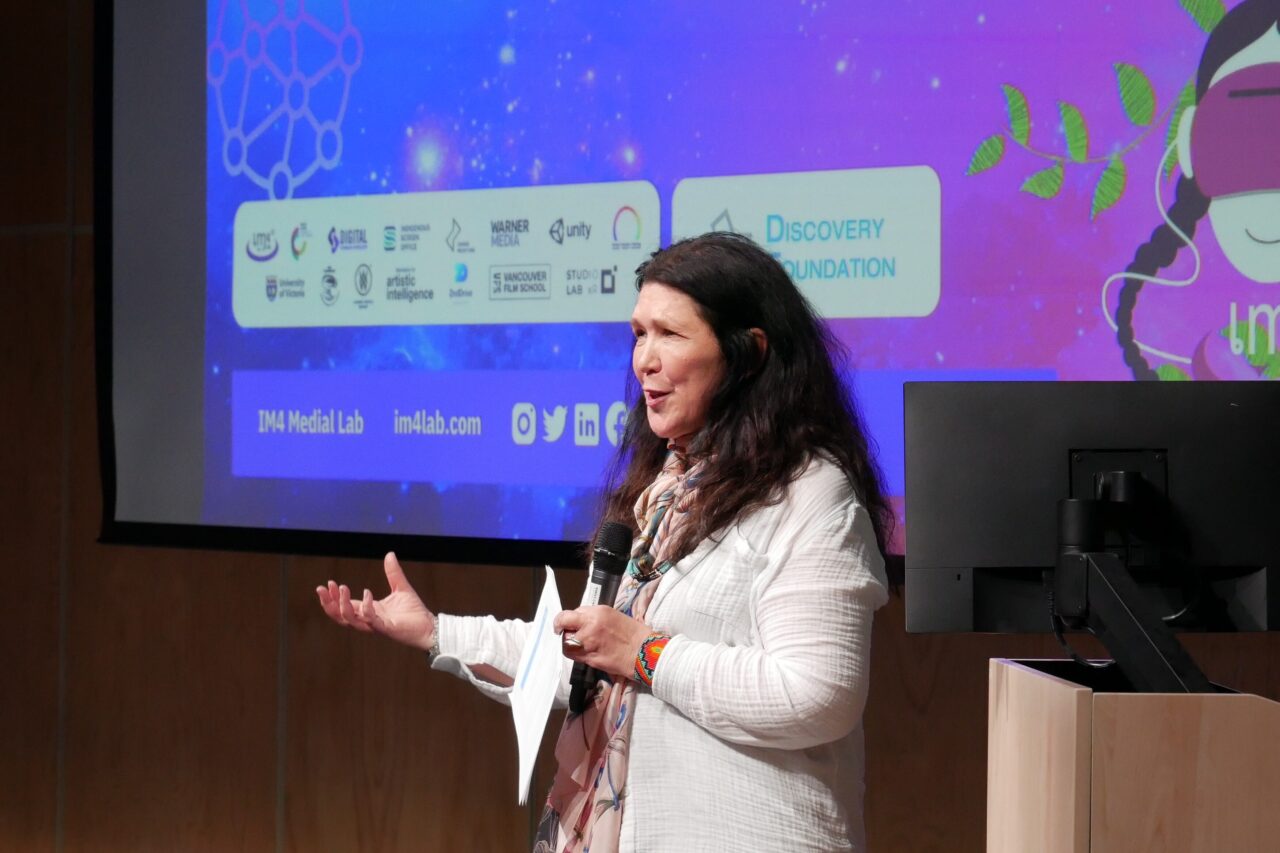IM4 Lab Celebrates Canada’s First Indigenous-led Virtual-Production Filmmaking Micro-Credential

(Image courtesy IM4 Lab)
Posted on
Attendance at the Aug. 26 screening of work by participants in the micro-credential is free.
Films by participants in Canada’s first Indigenous-led Virtual Production Storytelling micro-credential will be screened at an upcoming event at the Reliance Theatre at Emily Carr University.
On Aug. 26, 2023, Na wa shéw̓ay̓ ta sp'en̓ém - The Celebration will showcase the talents and commitment of students who completed the three-month micro-credential, which is run by Indigenous Matriarchs 4 Lab (IM4) in collaboration with Emily Carr University (ECU).
The celebration will also feature art exhibitions and guest speakers including award-winning filmmaker and IM4 Founding Matriarch + creative director Loretta Todd, IM4 Matriarchs T’uy’t’tanat-Cease Wyss, Tracey Kim Bonneau and Doreen Manuel, and Shenaz Baksh of Screen Industry Training Inc., who was the project lead for the micro-credential. Meanwhile, students will have the opportunity to network with industry leaders and professionals from across disciplines.
Over the summer, the Virtual Production Storytelling micro-credential trained 24 established and emerging Indigenous filmmakers in cutting-edge technologies. Participants learned to use the same groundbreaking techniques behind internationally acclaimed productions including The Mandalorian, Star Trek: Discovery, The Batman and Dune. These innovative tools allow filmmakers to create high-quality digital content more quickly and more efficiently.
Loretta notes that this micro-credential aligns squarely with IM4’s mission and purpose.
“As a collective of Media Matriarchs, we are guiding this innovative media lab to explore ways of using media technology like AI, XR, VR and VP in an Indigenous context,” she says. “We are driven by Indigenous governance, cultural and economic values and methodology. With this approach, we are Indigenizing the tech ecosystem, centring Indigenous ways and empowering Indigenous voices.”

IM4 Founding Matriarch and creative director Loretta Todd addresses participants in the Virtual Production Storytelling micro-credential. (Image courtesy IM4 Lab)
The curriculum includes mentorship from Indigenous and industry technical experts on state-of-the-art tools and production. The micro-credential took place both virtually and in-person at the Emily Carr University (ECU) Motion Capture Studio and the Integrated Motion Studio in collaboration with Vancouver-based production studio, Departure Lounge. Participants expanded their skills, built digital portfolios and created micro-short films, which will be on view at the screening. Upon completion of the training modules, participants will be awarded a micro-credential from ECU.
B.C.’s virtual production film sector is poised to grow by up to 20 per cent this year with the market size predicted to reach $5.1 billion by 2027. The virtual-production industry is set to be a key player in this rapidly growing ecosystem. Meanwhile, new changes to the Canadian Broadcasting Act requiring streaming services to invest in Canadian content are predicted to bring an influx of resources to Canadian productions, creating new opportunities for Indigenous and BIPOC producers.
“We are on the cusp of something big,” Loretta says. “By offering this industry-leading training at no cost to Indigenous creators, we are empowering our communities across the country right in their home territories and directly influencing the tech landscape. We need our people to tell our stories from our perspective and actively shape the field.”
Attendance at Na wa shéw̓ay̓ ta sp'en̓ém - The Celebration is free. Livestreaming options are available for those who are unable to attend in person. Visit IM4’s eventbrite page to learn more and register.
The cost of participation in the micro-credential was funded by IM4 Lab in partnership with Digital Technology Supercluster, Indigenous Screen Office, Canada Media Fund, Warner Media, Unity Technologies, Discovery Foundation, University of Victoria and sponsors including William F. Whites International, Laboratory for Artistic Intelligence, Rushcut Media/ZedDrive, Departure Lounge and Emily Carr University.